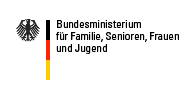Role of actors
Role of actors in putting Gender Budgeting into practice
Top Down
The implementation of GB is just as dependent as GM on the organisation’s leaders setting the appropriate goals and steps, i.e. top down, and supporting them in a credible way. This is generally so (e.g. for associations or economic research institutes) and is clearly the case for the field of public budget building as well. As a public budget is the expression of political prioritization on the part of the people responsible who have been elected to lead the respective political unit, an orientation to gender equality will only be expressed in budget building if it is being pursued as an important goal. The respective elected representatives of the people have a key position in this context.
Bottom up
As a rule, the work of civil society initiatives is crucial for the success of Gender Budgeting. They use public relations and lobbying to get Gender Budgeting onto the political agenda. By participating in or political support for administrative activities concerning Gender Budgeting, they are in a position to see whether these are simply paying lip service or are genuine efforts on behalf of ensuring gender equality in the distribution of resources. The most well-known German examples are the “Initiative for a fair budget in terms of gender” based in Berlin and the “Gender Budget Initiative Munich”.
The implementation of GB is just as dependent as GM on the organisation’s leaders setting the appropriate goals and steps, i.e. top down, and supporting them in a credible way. This is generally so (e.g. for associations or economic research institutes) and is clearly the case for the field of public budget building as well. As a public budget is the expression of political prioritization on the part of the people responsible who have been elected to lead the respective political unit, an orientation to gender equality will only be expressed in budget building if it is being pursued as an important goal. The respective elected representatives of the people have a key position in this context.
- Gender equality issues are often treated more seriously in representational assemblies than in the executive.
- Deciding on the budget is one of the most important control rights vis-à-vis the executive.
Bottom up
As a rule, the work of civil society initiatives is crucial for the success of Gender Budgeting. They use public relations and lobbying to get Gender Budgeting onto the political agenda. By participating in or political support for administrative activities concerning Gender Budgeting, they are in a position to see whether these are simply paying lip service or are genuine efforts on behalf of ensuring gender equality in the distribution of resources. The most well-known German examples are the “Initiative for a fair budget in terms of gender” based in Berlin and the “Gender Budget Initiative Munich”.
Role of actors in implementation
Top down is also essential for the practical implementation of the necessary analyses and assessments. These can only success if the management in the competent organizational fields takes this task seriously and allocates the time and money required.
Gender sensitive participation of citizens in building and assessing public budgets is an important element of Gender Budgeting. By means of gender sensible participation processes, the interests and needs of all those affected by the budget can be taken into account without gender-specific distortions in the decision-making process.
For the process of building a public budget, the Resolution of the European Parliament on GB also includes “developing a bottom-up budgetary process and promoting the involvement and participation of all citizens - men and women – [...] with the aim of identifying different specific needs and appropriate policies and measures to respond to them”.
Gender sensitive participation of citizens in building and assessing public budgets is an important element of Gender Budgeting. By means of gender sensible participation processes, the interests and needs of all those affected by the budget can be taken into account without gender-specific distortions in the decision-making process.
For the process of building a public budget, the Resolution of the European Parliament on GB also includes “developing a bottom-up budgetary process and promoting the involvement and participation of all citizens - men and women – [...] with the aim of identifying different specific needs and appropriate policies and measures to respond to them”.
erstellt von Administrator
—
zuletzt verändert:
02.01.2010 20:07





